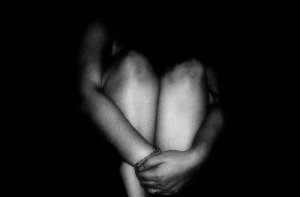Not Only Does Depression Indicate Sadness But Also Irritability

Not only is sadness continuous and intense, it is rather the hopeless, discouraged, or “in a a well” state of mind which is indicative of depression. In fact, sadness as a symptom may not manifest in a depressed person, being that irritability is its cousin.
Yes. As rare as this statement seems, a depressed person may not appear to be sad, but they will show to be irritable, frustrated or unstable. Somatic complaints, moodiness, discomfort, physical pain, emotional roller coasters, etc. All this can replace sadness as a symptom of an emotional problem like depression.
So, we could say that manifestations of anger and insensitivity, irritability, aggression and “authoritarian” behavior are sometimes cries calling out of the pit of blackness in which depression drowns us.

Irritability as diagnostic criteria for depression
According to the criteria of both the latest version of the Diagnostic Manual of Mental Disorders (DSM-5) and the International Classification of Diseases (ICD-10), a clinical diagnosis of depression can be carried out if the person, among other conditions, shows irritability instead of sadness.
That is, a constantly morose person who shows persistent anger, a tendency to respond to events with angry outbursts or insulting others or an exaggerated sense of frustration over minor things, may be immersed in a pathologically depressed mood.
Children and adolescents may present a state of irritability or instability rather than a sad and dispirited mood. This must be distinguished from what is considered the pattern of “spoiled child” with irritability to frustrations.
However, it should be emphasized that just like sadness itself is not a sufficient criterion of depression and other connotations are needed for it to be considered pathological, the same goes for irritability.
Specifically, to make a diagnosis of depression according to the classification systems mentioned, these two separate conditions and sufficient in intensity are necessary but not sufficient. Therefore, so we must consider that we are not going to understand that it is enough to be sad or angry to be depressed.

Sadness and irritability are emotional states that are unfairly treated
Sadness and irritability themselves are healthy emotional states which are intended to inform us that there is something that is bothering or hurting us. They only become pathological when they distort our lives and greatly impair our personal, social and working spheres for a long time.
With irritability you usually have to be careful because through it we can do anything without having to experience something negative. Thus, a persistent state tinted with this instability can be devastating.
Losing your temper easily, making nasty comments, being intolerant, showing impatience, feeling nervous, manifestations of agitation, inappropriate reactions, starting to move away from certain people for being unpleasant, etc. All this is an indication that something is wrong in our life and we have to take action.

Thus, anger or irritability that occurs when we suffer a depression is a way to outsource what you feel and what is not expressed. Let’s say that the depressed person has a feeling of being oppressed, of wearing a scarf around his neck that weighs a ton.
This makes him feel depressed, like his vitality is fading and that scarf will not let him walk. It dulls his life and unbalances his spirits. This accounts for the instability and the difficulty these people have to carry out activities in their daily lives.
So, with the few forces that this sinister scarf allows him to keep, he is able to eat and sleep at most. This is the weight of anguish, which translates into a suffocating reality of sadness or irritation depending on the person and, of course, depending on the moment.
Depression and Anxiety Are Not Signs of Weakness
Depression and anxiety are not synonymous with weakness or a result of personal choice contaminated by surrender or negligence. See more
Not only is sadness continuous and intense, it is rather the hopeless, discouraged, or “in a a well” state of mind which is indicative of depression. In fact, sadness as a symptom may not manifest in a depressed person, being that irritability is its cousin.
Yes. As rare as this statement seems, a depressed person may not appear to be sad, but they will show to be irritable, frustrated or unstable. Somatic complaints, moodiness, discomfort, physical pain, emotional roller coasters, etc. All this can replace sadness as a symptom of an emotional problem like depression.
So, we could say that manifestations of anger and insensitivity, irritability, aggression and “authoritarian” behavior are sometimes cries calling out of the pit of blackness in which depression drowns us.

Irritability as diagnostic criteria for depression
According to the criteria of both the latest version of the Diagnostic Manual of Mental Disorders (DSM-5) and the International Classification of Diseases (ICD-10), a clinical diagnosis of depression can be carried out if the person, among other conditions, shows irritability instead of sadness.
That is, a constantly morose person who shows persistent anger, a tendency to respond to events with angry outbursts or insulting others or an exaggerated sense of frustration over minor things, may be immersed in a pathologically depressed mood.
Children and adolescents may present a state of irritability or instability rather than a sad and dispirited mood. This must be distinguished from what is considered the pattern of “spoiled child” with irritability to frustrations.
However, it should be emphasized that just like sadness itself is not a sufficient criterion of depression and other connotations are needed for it to be considered pathological, the same goes for irritability.
Specifically, to make a diagnosis of depression according to the classification systems mentioned, these two separate conditions and sufficient in intensity are necessary but not sufficient. Therefore, so we must consider that we are not going to understand that it is enough to be sad or angry to be depressed.

Sadness and irritability are emotional states that are unfairly treated
Sadness and irritability themselves are healthy emotional states which are intended to inform us that there is something that is bothering or hurting us. They only become pathological when they distort our lives and greatly impair our personal, social and working spheres for a long time.
With irritability you usually have to be careful because through it we can do anything without having to experience something negative. Thus, a persistent state tinted with this instability can be devastating.
Losing your temper easily, making nasty comments, being intolerant, showing impatience, feeling nervous, manifestations of agitation, inappropriate reactions, starting to move away from certain people for being unpleasant, etc. All this is an indication that something is wrong in our life and we have to take action.

Thus, anger or irritability that occurs when we suffer a depression is a way to outsource what you feel and what is not expressed. Let’s say that the depressed person has a feeling of being oppressed, of wearing a scarf around his neck that weighs a ton.
This makes him feel depressed, like his vitality is fading and that scarf will not let him walk. It dulls his life and unbalances his spirits. This accounts for the instability and the difficulty these people have to carry out activities in their daily lives.
So, with the few forces that this sinister scarf allows him to keep, he is able to eat and sleep at most. This is the weight of anguish, which translates into a suffocating reality of sadness or irritation depending on the person and, of course, depending on the moment.
Depression and Anxiety Are Not Signs of Weakness
Depression and anxiety are not synonymous with weakness or a result of personal choice contaminated by surrender or negligence. See more
This text is provided for informational purposes only and does not replace consultation with a professional. If in doubt, consult your specialist.







